Shallot is renowned for its harmonious blend of sweet and pungent notes, earning it popularity among both professional chefs and home cooks. However, what if a recipe calls for chopped or sliced shallots, and this ingredient is missing?
Fear not. In this post, we will share the best substitutes for shallots, ensuring that your dishes retain their intended flavor profile even without this allium family gem.
What is Shallots
Shallots are a smaller type of onion with a milder flavor than regular onions. They grow in clusters, where separate bulbs are attached at the base, similar to garlic. Shallots have a delicate, sweet taste with a hint of sharpness, making them favored in culinary use for dressings, sauces, and seasoning. Their skin ranges from golden brown to reddish-purple, and they have pink to purple flesh. Shallots are used both raw and cooked, adding depth and aroma to dishes.
The 11 Best Shallot Substitutes For Your Recipes
Red Onion
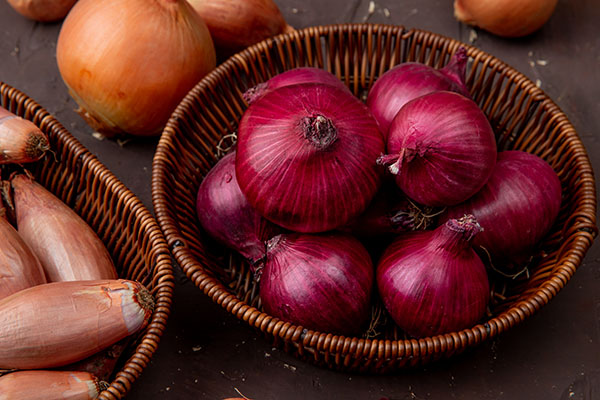
Image by stockking on Freepik
Red onion stands out as the best substitute for shallots, primarily due to its similar color profile and well-balanced flavor, which echoes the mild, sweeter flavor of shallots. While red onions are slightly more pungent, their inherent sweetness, when cooked, makes them an excellent alternative in various dishes.
When using red onion substitute shallots, a general guideline is to use a slightly smaller quantity than the shallots called for in the recipe. This adjustment accounts for the red onion's stronger flavor, ensuring it doesn't overpower the dish. If the recipe requires chopped shallots, replace them with an equivalent amount of chopped red onion.
Red onions are particularly suitable in cooked recipes where their sweetness can be brought out, such as in sauces, sautés, and roasts. They also work well raw in salads like Greek salad, shopska salad, and dressings, where their vibrant color and crisp texture can be a visual and textural delight. However, for raw applications, consider soaking the sliced red onion in water for a few minutes to soften its sharpness, bringing it closer to the delicate bite of shallots.
Yellow Onions
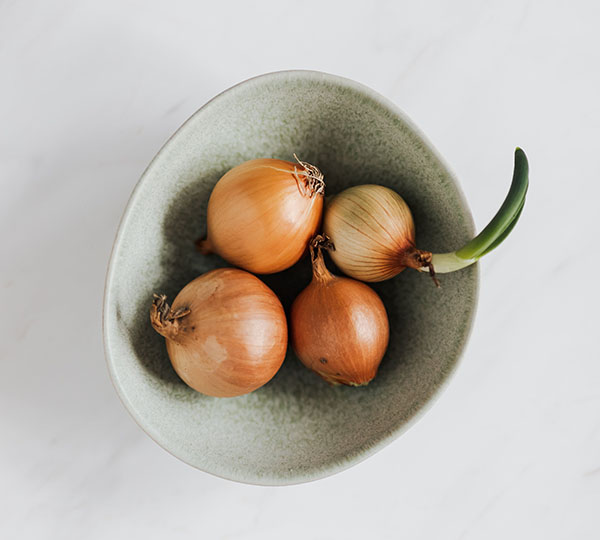
Yellow onions are often considered the best substitute for shallots, thanks to their widespread availability and flavor profile closely resembling the essence of shallots. While yellow onions have a stronger, more robust flavor than the subtle delicacy of shallots, they soften and sweeten beautifully when cooked, making them a versatile alternative.
Due to its more robust flavor, consider using a smaller quantity of yellow onion than the recipe suggests for shallots. When substituting yellow onions for shallots, it's advisable to use a smaller amount—about three-quarters of the quantity of shallots in the recipe. This adjustment ensures that the more pronounced flavor of yellow onions doesn't overwhelm the dish.
Yellow onions excel in cooked dishes like soups, stews, and sautés, where their depth of flavor can develop and complement other ingredients. Cooked onions are particularly effective in recipes that benefit from a hearty, savory profile, adding richness without the sharpness of cooked shallots. For raw applications, tempering the yellow onion by soaking it in cold water or pickling it can help mellow its intensity, making it a closer match to the mild taste of raw shallots.
Green Onions Or Scallions
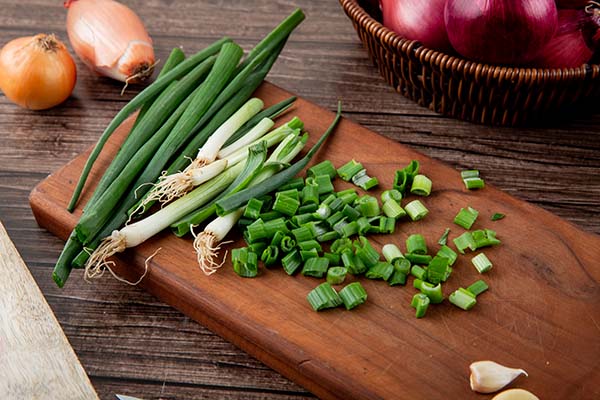
Image by stockking on Freepik
Green onions, also known as spring onions and scallions, are an excellent shallot substitute, particularly in recipes with a milder flavor. Their gentle onion taste, combined with a hint of fresh, grassy notes, mirrors the subtle complexity of shallots.
When a recipe calls for shallots, it's recommended to use an equal amount, focusing on the white and light green parts for a flavor closest to shallots. This substitution shines in raw applications like salads, dressings, and garnishes, where green onions impart a delicate onion flavor without overpowering other ingredients. They are also suitable for light cooking in dishes like stir-fries and soups, adding a layer of flavor reminiscent of shallots but with a fresher, crisper character.
Adding green onions towards the end of the cooking process is important to preserve their texture and vibrant color, maintaining the aesthetic and taste appeal that shallots typically bring to a dish.
Leeks

Leeks are a superb substitute for shallots, offering a mild and slightly sweet flavor profile that aligns well with the delicate taste of shallots. The key to using leeks as an effective alternative lies in their gentle onion-like essence, which is less intense and more nuanced than other onion varieties.
When substituting leeks for shallots, utilizing the white and light green portions is advisable, as they closely mimic the mildness of shallots. Use an equal amount of leeks as the shallots when a recipe calls for shallots in the recipe typically.
Leeks are particularly effective in cooked dishes where their subtle flavor melts seamlessly with other ingredients, such as soups, stews, and sauces. They also excel in slow-cooked recipes, where their delicate flavor can develop and enhance the overall taste without dominating it.
Fresh Garlic
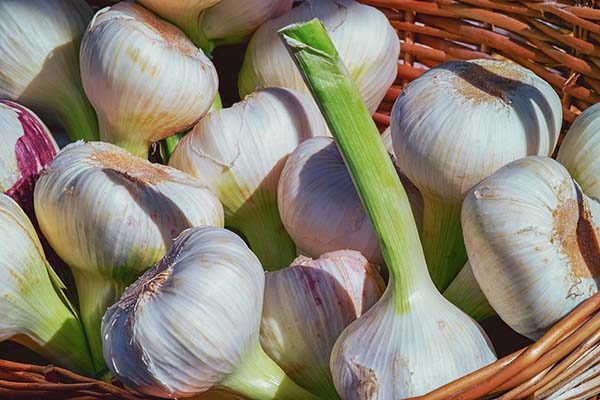
Fresh garlic stands out as a unique substitute for shallots, bringing its own characteristic punch of flavor. While more pungent and assertive than the mild, nuanced taste of shallots, garlic can add depth and intensity to dishes where shallots are called for.
When using garlic as a substitute, it's crucial to moderate its stronger flavor. A good rule of thumb is to use one small clove of garlic for every small shallot in the recipe or about half a teaspoon of minced garlic for each teaspoon of chopped shallots. This substitution works best in cooked dishes where garlic's robust flavor can mellow out, harmonizing with other ingredients and imparting a rich, savory note. It's particularly effective in sautés, sauces, and marinades, where garlic can be a backbone of flavor.
For raw applications or dishes where a more subtle shallots taste is needed, blending minced garlic with a milder onion variety, like red or green onions, can create a more balanced, shallot-like flavor profile. Unlike raw garlic, roasted garlic has a sweeter and richer note with milder flavor than raw counterparts. For these reasons, roasted garlic can be one of the best shallot substitutes.
Garlic Powder
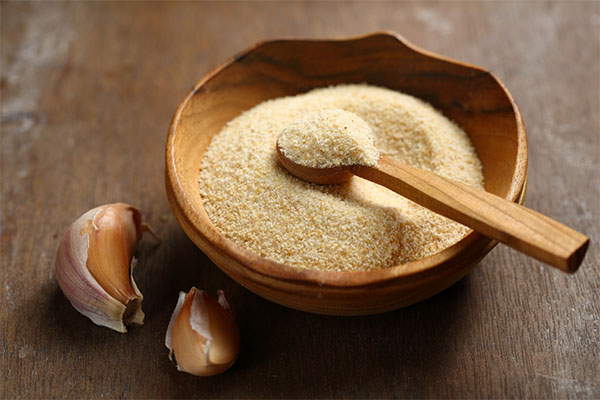
Garlic powder offers a convenient and flavorful substitute for shallots, particularly when a dried, shelf-stable option is desirable. Its concentrated, savory essence captures some of the pungency of shallots, albeit with a distinct garlic profile.
When replacing shallots with garlic powder, it's crucial to consider the powder's potency. When a recipe calls for shallots, a general guideline is to use about ⅛ teaspoon of garlic powder for every teaspoon of chopped shallot. This ratio ensures that the garlic flavor enhances the dish without overpowering it.
Powdered garlic is especially useful in spice rubs, marinades, and sauces, where its fine texture and intense flavor can evenly permeate the dish. It's also a great option for recipes that benefit from a more subdued onion-like presence or when the moisture content of fresh shallots might affect the dish's outcome.
However, in recipes where shallots' texture and freshness are key, there may be better substitutes than garlic powder, but they can still provide a flavorful backup in a pinch.
Garlic Scapes
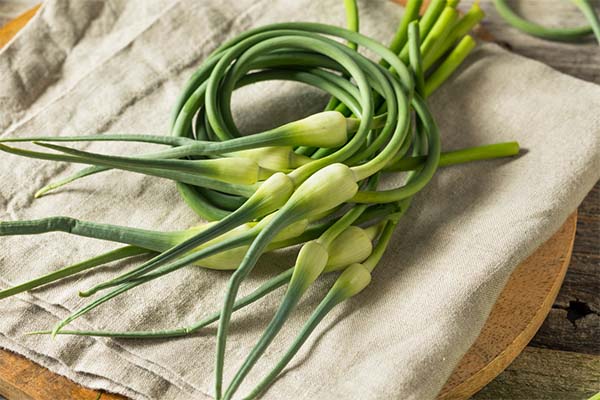
Garlic scapes, the curly green stalks of garlic plants, are an intriguing substitute for shallots. They offer a unique combination of mild garlic flavor with a fresh, herbaceous twist. Their delicate taste, less intense than mature garlic bulbs, aligns closely with shallots' mild, slightly sweet profile.
A one-to-one volume ratio typically works well when substituting garlic scapes for shallots. This equivalence maintains the balance of flavor intensity and texture in the dish. Garlic scapes are particularly effective in recipes where a subtle hint of garlic is desired without overwhelming the other flavors. They shine in fresh applications like salads, dressings, and pestos, adding a crisp, slightly garlicky note.
In cooked dishes, such as stir-fries, soups, and egg dishes, garlic scapes can be sautéed or blanched, softening their texture while imparting a gentle, shallot-like flavor. Their unique shape and vibrant color also add an aesthetic appeal to dishes, making them a functional and visually pleasing alternative to shallots.
White Onion
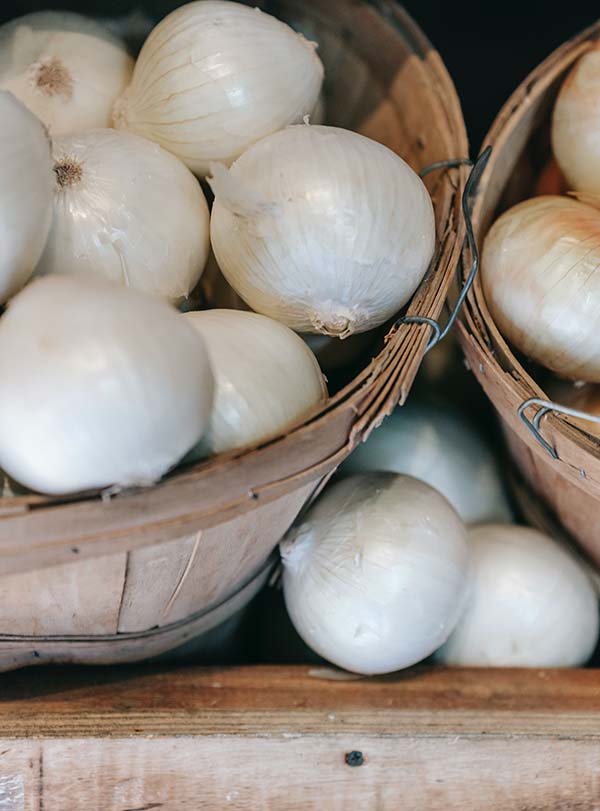
White onion is one of the best substitutes for shallots. Its sharp and bright flavor, while more intense, can mimic the essence of shallots in various dishes. Its clean, strong taste, with a hint of sweetness when cooked, makes it suitable for recipes where cooked shallots are used for their distinct onion flavor.
When substituting white onions for shallots, it's advisable to use a slightly lesser amount—about three-quarters of the shallots called for. This adjustment helps to balance the more pronounced flavor of white onions. They are particularly effective in recipes where a robust onion presence is desired, such as in roasts, stews, and sauces.
White onions also perform well in raw applications, such as salsas or salads, whose crisp texture and potent flavor can stand in for the milder crunch of shallots. For a closer match to shallots' mildness, sautéing the white onion lightly can help soften its bite, making it a versatile and readily available alternative.
Pearl Onions
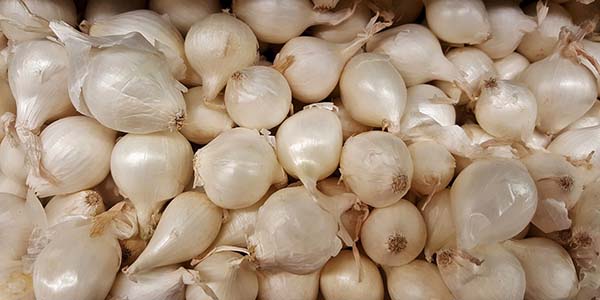
Pearl onions are a noteworthy substitute for shallots, particularly in recipes where size and appearance matter. Their small, round shape and sweet, mild flavor closely resemble shallots, making them an excellent choice for dishes where shallots are a key visual and taste component.
When substituting pearl onions for shallots, you can use them in a one-to-one ratio by volume. This direct substitution is effective because their flavors are complementary, and their similar size ensures a consistent texture in the dish.
Pearl onions are especially suitable in recipes that call for whole shallots, like roasts or pickles, where they can be used whole or halved. They also excel in slow-cooked dishes, such as stews and braises, where their sweetness intensifies, closely mimicking the depth and richness of cooked shallots.
Onion Powder
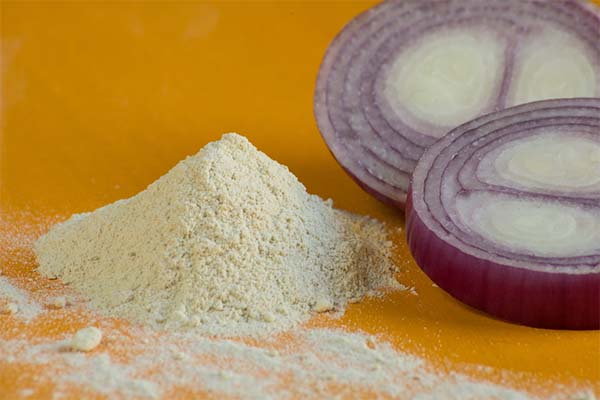
Onion powder is an excellent shallot substitute when convenience and shelf stability are priorities. This finely ground seasoning delivers a concentrated onion flavor that, while more robust than the delicate taste of shallots, can effectively mimic their role in various recipes.
The key to using onion powder as a replacement lies in its potency. About ½ teaspoon of onion powder can typically be used for every tablespoon of minced shallot. This ratio ensures the onion essence is present without dominating the dish.
Onion powder is particularly useful in seasoning mixes, dry rubs, and dishes where moisture content needs to be controlled. It's also a great choice for sauces, soups, and stews, where it dissolves seamlessly, imparting a subtle onion flavor.
However, in recipes where the texture and freshness of shallots are crucial, there may be better fits than onion powder. Still, it remains a convenient and effective alternative in most other scenarios.
Sweet Onion
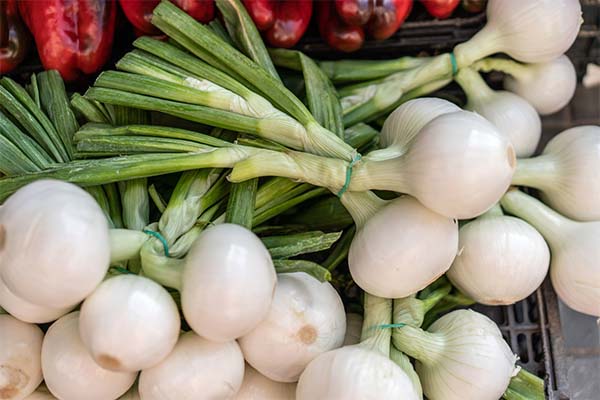
Sweet onions, with their mild and sugary flavor profile, are an excellent shallot substitute, especially in recipes where a gentle, subtle onion taste is desired. Unlike sharper onion varieties, sweet onions have a lower sulfur content, resulting in a less pungent and more delicate flavor that closely aligns with the nuanced sweetness of shallots.
When substituting sweet onions for shallots, use them in equal amounts. This one-to-one substitution works well because their flavors are comparable in intensity. Sweet onions are particularly well-suited for raw applications, such as salads, sandwiches, and dressings, where their mildness can replicate the understated presence of shallots without overpowering other ingredients.
They also perform admirably in cooked dishes like caramelized onion preparations, where their natural sugars enhance the dish's flavor profile. While sweet onions are larger than shallots, finely dicing or slicing them helps achieve a similar texture, making them a versatile and flavorful alternative for various culinary uses.
